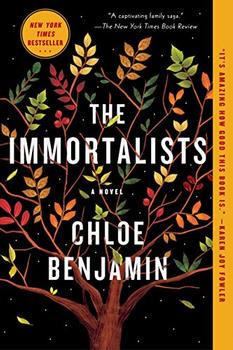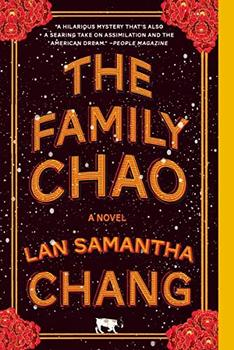Summary | Excerpt | Reading Guide | Reviews | Beyond the book | Read-Alikes | Genres & Themes | Author Bio

A Novel
by Chloe BenjaminOn a summer day in 1969 in New York City, the Gold children agree to seek out a mysterious neighborhood fortune teller who is rumored to be able to predict the day you will die. One by one they enter the psychic's apartment, from youngest to oldest – Simon, Klara, Daniel, and finally Varya – to receive their fortune, which they are warned to keep secret. As the siblings regroup outside, visibly distressed, they realize that whether the fortune teller is genuine or a charlatan is almost inconsequential; these predictions are going to haunt them for the rest of their numbered days.
After this intriguing prologue, The Immortalists shifts into four distinct sections set over the next fifty years, each focusing on one of the Gold siblings as they forge their own identities in light of their fortunes.
This simple but effective mystical conceit allows Benjamin to expertly play with our notions of pre- and self-determinism. What makes it even more gripping is that she never makes it explicit whether the psychic's predictions are self-fulfilling or not. It is up to the reader to decide, and without spoiling anything, suffice to say that there's plenty of evidence for both sides of the argument. Whichever one readers choose probably indicates which of the Golds' lives, and consequently which chunk of the novel most resonates with them.
Simon flees to San Francisco where he can explore his sexuality freely and, given the naivete of the times, rather recklessly. Klara dedicates her life to becoming a stage magician, living a freewheeling existence trying to make ends meet. Daniel and Varya, the older pair, opt for more conventional, quiet lives closer to home and their widowed mother. Daniel falls in love and becomes an army doctor. Varya steadily isolates herself from people and relationships, choosing to throw herself into her scientific research to prolong life.
Benjamin beautifully presents these four individual lives, with their own enviable ups and tragic downs. They all feel equally believable and each sibling acts according to his or her own interior logic. Daniel, who was the one to instigate the visit to the fortune teller in the first place, feels a lifelong sense of guilt for having caused his siblings so much mental turmoil. He is constantly trying (and failing) to keep his family safe and tightly knit. Klara, who is perhaps the one sibling to fully embrace her fortune, throws herself into life, happy to dedicate her time to her passion for stage magic even if it comes at a cost.
It is perhaps Benjamin's deftness in writing about familial matters that is most exquisite. From section to section, the reader is made to empathize with the brothers and sisters as they navigate a shared inner conflict between family duty and personal desires with their looming death days in mind. With uncluttered incisive prose, the author constantly brings to light the quiet tensions and bonds operating just under the surface of the relationships between the Gold family. She gracefully shows the small rifts that have the potential to become irreconcilable fractures, such as when Simon goes against his mother's wishes and runs away from his responsibilities to the family tailoring business. In this moment he realizes "there now exists a pane of glass between him and his former home, a pane he can see through but not cross." It is a subtle observation perfectly and concisely expressed, which anyone can relate to as we all face that point of no return when adulthood beckons.
Conversely, at a point when Klara is forced to return home, feeling trepidation at the prospect since she hasn't seen her family in years, she only has to walk through the door and see her sister Varya to realize "the time apart did not matter, not yet. They were sisters. That mattered, nothing else." It's these moments that are the glue of the novel, and as a reader you are really made to feel that no matter how far apart the siblings are — geographically, emotionally, in life and in death — they are forever bound to each other. These gentle, often unspoken intimate moments particularly stick in mind and tug at the heartstrings, even more so than all the dramatic, suspenseful scenes.
The Immortalists' one discernible shortcoming is arguably its length. At around 350 pages, once we are past the prologue, each Gold sibling is afforded approximately 80 pages of dedicated time. All things considered, that's a rather short while to establish where they are presently at in adult life, to garner insight into their backstory, to understand their worldview, their idiosyncrasies, their motivations, their raisons d'etre. No sooner are we fully invested in one of the Golds' lives than their narrative arc comes to an all-too-soon conclusion, and we're whisked onward to the next sibling only to begin the process of acquaintanceship all over.
On the one hand, this succinctness keeps the pace moving along and makes for a lean entertaining novel. There really are no dull moments here, no unnecessary digressions. Also to this point, pretty much every character serves a function. Every key supporting character introduced re-enters the fold at a later stage in the novel to some degree. Benjamin is evidently not one for waste.
The downside of this is, because it is so skilfully and intricately woven, the novel does ring a little false on the whole. Real life is full of incidental moments and tangential events. We have odd and sometimes meaningful encounters with people whom we never see again. It's these loose ends that make for a richer, more serendipitous existence. As such The Immortalists would have perhaps benefited from a lengthier showing that would have allowed for a smattering of calculated detours to more accurately reflect the winding, haphazardness of everyday life.
Ultimately, this criticism serves as a testament to Benjamin's effortless writing style and the likeability of her characters that by the end, the reader wishes they had been given more time to spend with each of the four siblings. While there is plenty to enjoy in the way of story and characterization, it is perhaps the profound ideas and questions the novel poses about fate and free will that will stay with readers and make The Immortalists one of 2018's most discussed novels.
![]() This review was originally published in The BookBrowse Review in January 2018, and has been updated for the
February 2019 edition.
Click here to go to this issue.
This review was originally published in The BookBrowse Review in January 2018, and has been updated for the
February 2019 edition.
Click here to go to this issue.

If you liked The Immortalists, try these:

by Taffy Brodesser-Akner
Published 2024
An exhilarating novel about one American family, the dark moment that shatters their suburban paradise, and the wild legacy of trauma and inheritance, from the New York Times bestselling author of Fleishman Is in Trouble.

by Lan Samantha Chang
Published 2022
An acclaimed storyteller returns with "a gorgeous and gripping literary mystery" that explores "family, betrayal, passion, race, culture and the American Dream" (Jean Kwok).
Nearly all men can stand adversity, but if you want to test a man's character, give him power.
Click Here to find out who said this, as well as discovering other famous literary quotes!
Your guide toexceptional books
BookBrowse seeks out and recommends the best in contemporary fiction and nonfiction—books that not only engage and entertain but also deepen our understanding of ourselves and the world around us.